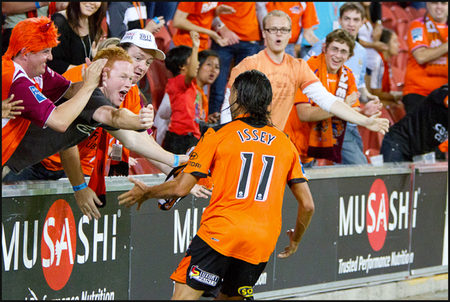During Issey Nakajima-Farran’s very first soccer game, he scored a goal. But there was one problem. He was eight, playing for his school team in Japan. His opponent took a shot that slid past his keeper, but the ball wasn’t travelling fast enough to reach the back of the net. So Nakajima-Farran gave it his all, sprinting hard in an effort to tackle the ball, and kick it out of harms way.
With a smile on his face, he tells Nikkei Voice, “And then I scored on my own goal. So that was the first time I ever scored.”
Nakajima-Farran, now 30, has played professional soccer on four continents, and has represented Canada’s national men’s team since 2006. Born in Calgary to a Japanese mother and a British father, he’s found a home with Canada’s national team in the midst of an on-the-go career.
For him, soccer has been a roller coaster of emotions. Coaching decisions has led to self-doubt, and at his lowest point, he’s even questioning whether soccer is really for him. But, what separates Nakajima-Farran from all of the other players that walk through the tunnel on their way to the field, is that he has learned to see the light at the end of the occasionally dark path that life has made him walk through.
His success is largely due to his ability to persevere through situations that most people would consider negative, while managing to turn them into life-shaping, positive events.
As a boy, even before he’d played his first game, he fell in love with soccer after watching Tokyo Verdy playing in the J.League.
So, he tried out for their youth squad, competing with 800 other boys who’d also come to make their dreams come true.
He was one of the final three boys in contention. They learned their fate by letter. He opened it, only to read that he wasn’t chosen.
“I was never so heartbroken in my life. And I was ready to quit football at the age of nine.” His father told him, “If you’re serious about this, then you’re going to train every day and try out again in eight months time.”
His dad brought him to the Tama River every morning for an hour before school to train with his soccer ball.
Eight months later, he tried out for Tokyo Verdy again. “I got in this time,” he says.
For a year, Nakajima-Farran was living the dream. He was playing for the best team in Japan’s youth soccer system, where he would see his idols in the practice facility every day.
But Nakajima-Farran’s parents, who owned several restaurants, were looking for a new adventure. So they left Japan, justifying the move by telling him, “Football is huge in England, let’s move there.”
He played soccer for the next six years in London on Crystal Palace FC’s youth team.
At the age of 16, Crystal Palace told Nakajima-Farran that if he wanted to be a part of the system, he had to drop out of school, train every day, and make a little bit of money every week.
Seeing that only about one in every 10 boys makes it pro, and the others are left without an education to fall back on, he realized that “obviously an education is a very important thing.”
He went back to his old club, this time without his parents, playing for Tokyo Verdy’s youth squad. He then graduated from Yokohama International School and earned his diploma in Japan.
Nakajima-Farran’s couple of years back at Tokyo Verdy were tough. In youth systems, typically if you’re 18, you should be a starting member. But Nakajima-Farran was constantly in and out of the starting lineup, coming off the bench over half of the time.
“I remember one comment during training, when my coach shouted at me, ‘Hey Gaijin (foreigner). Go back to your home country!’”
“Here I am, 17-years-old, hearing this crap. I was thinking maybe football isn’t for me. What the hell am I doing? I’m missing out on growing up in a normal way.”
Throughout, his father kept him motivated, telling him that he had what it takes and to stay positive. Even though there were lots of good moments, Nakajima-Farran says, “You don’t remember those. It’s the bad times you really remember, especially the ones that really hurt you.”
While playing for Tokyo Verdy in a big showcase tournament, with scouts from every major team in the J.League watching, he came in off the bench and played like a man on a mission. He led his team in goals for the tournament.
Afterwards, Nakajima-Farran signed his first professional contract with Albirex Niigata, a team in the Japanese League’s first division. But they never gave him a chance to play for the team’s big league squad. They put him into their feeder team, Niigata Singapore FC, with their other prospects.
He went on to score 26 goals in 46 games and won the S.League’s “Young Player of The Year Award.”
The way that he was treated by his coaches on Albirex Niigata and Tokyo Verdy sticks with him to this day.
“[Others] got the sugar and cream from the coach, and I got dirt. Those are the grudges that really kept me fighting through hard seasons, hard letdowns. Because I knew one day I wanted to prove to these guys that I was actually worth something. Because they treated me like nothing,” he says.
In 2005, looking to showcase himself for the Japanese National team while representing Singapore’s under-23 national team, he scored two goals against Japan—earning himself the man of the match.
After the game, the Japanese head coach shot him down in the media, saying that he has enough Japanese talent and “good luck elsewhere, Issey.”
“That’s when Canada kicked in,” Nakajima-Farran says.
He’s earned himself 29 appearances, 17 starts, and has played in games against some of the top talent in the world, including the likes of Columbia, Brazil, and Japan. All three were games that Canada fought hard in and surprised a lot of people, holding their own and losing by only a single goal in all three matches.
Nakajima-Farran became the first player to start professionally in Japan and drop his nationality to represent another country.
He also had a brief stint with Toronto FC, where he scored two goals in five appearances and was showing promise. But, to the dismay of many TFC fans, he was traded, on his birthday no less, to the Montreal Impact on May, 16, 2014.
He hasn’t seen much playing time on the MLS pitch since then.
“I’m not the happiest player right now on the team, but Benito (Team Canada’s head coach) is keeping my spirits high and I’m so grateful for what he does for me and I have so much respect for him.”
Another thing keeping Nakajima-Farran’s morale high is his second passion, his art.
His love for art began at the age of 13 in England, when an opposing keeper took out his ankles on a play.
“My whole summer break was kind of ruined. Two months in a cast, and my dad just pulled out some vegetables and a sketch book,” he says. “I was just like, ‘C’mon dad, I don’t want to do this crap, kind of thing.’ But then I did it and realized that this is pretty cool.”
“Football is always my first passion, but art is my second,” Nakajima-Farran says. He figured out that he truly loves art after one of his teammates in Denmark requested a painting. It was for his wife’s father, who was a big fan of The Rolling Stones before he died. His favourite poster was of Mick Jagger smiling.
“I painted it and when she saw it, she burst out crying. I never knew I had that power to move someone so emotionally,” Nakajima-Farran says. “And, I see how emotional fans are on the sidelines and it still amazes me. Because I feel I’m still doing my thing as a child, kicking a ball and chasing it.”
Nakajima-Farran’s rise to the pros has been far from linear, but his love for the game is unwavering. “I’m not done playing yet,” he says. “I’m still hungry for more.”
“Really, it’s your life. You’ve got to do what moves you. Football is what makes me happy and with art, I see how it moves people and that makes me happy,” he says. “With football, it’s really to satisfy my hunger for the love of the game. And I’m not done loving it yet.”
Photos: Courtesy of Issey Nakajima-Farran.
*This article was originally published on Nikkei Voice on November 19, 2014.
© 2014 Luke Galati, Nikkei Voice







